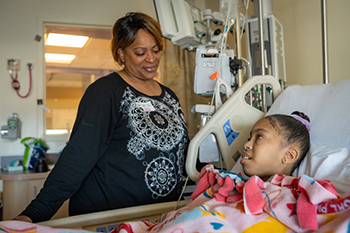Transplant provides new hope for 14-year-old with chronic kidney disease
Their lives changed in an instant.

More than a year ago, 14-year-old Aija Hall and her mother Angela Lasseter received the devastating news that she had chronic kidney disease.
She went from being a healthy pre-teen one day to being hospitalized at Kaiser Roseville with very high blood pressure, high creatinine levels (creatinine is a chemical that indicates if your kidneys are working well) and rapid heart rate the next day. She was having fluid buildup in her body.
The doctors took a biopsy and the results came back.
“They said, “It looks like both kidneys are gone,” Lasseter said.
Aija was transferred to UC Davis Children’s Hospital to receive the specialty kidney care that she needed. Its pediatric nephrology program is ranked 25th nationally by U.S News & World Report’s Best Children’s Hospitals rankings in 2020-2021.
At UC Davis Children’s Hospital, she was diagnosed with focal segmental glomerulosclerosis (FSGS), a disease in which scar tissue develops on the parts of the kidneys that filter waste from the blood (glomeruli).
She would need dialysis. She had a long road ahead.
Dialysis – a bridge to transplant
Surgeons placed catheters in Aija’s neck and her belly to prepare her for dialysis treatment. Within a day or two after surgery, she began hemodialysis in the hospital. Slowly, her fluid buildup and swelling went down. Her numbers stabilized.
She would need 11 hours of dialysis every day. The UC Davis pediatric outpatient peritoneal dialysis program was a lifeline. The program is the only one in inland Northern California that offers home dialysis for patients as young as 10 years old or 44 pounds.
“I originally thought no. I was too stressed out. But I thought about it and prayed about it. I became her nurse at home,” Lasseter said.
She trained with pediatric dialysis nurse Bertha Ramirez-Preciado. Lasseter learned how to perform dialysis at home. The hospital delivered the machine to her home along with all of the needed supplies and fluids.
“They give you everything you need and teach you step by step,” Lasseter said. “We’ve built really great relationships with the team and they have provided as much support as I needed.
By the summer of 2020, Aija was placed on the donor list for a kidney transplant. Her blood type was B positive, which is very rare. Lasseter knew she would wait much longer for a kidney donor with her blood type.
“We held on,” Lasseter said.
Kidney transplant provides new hope
Her family will forever remember Feb. 2, 2021 as the day that Aija got a new kidney.
“I answered the phone and they said, ‘We have a kidney for her.’”
It was the call they had waited for … and it came more than one year after her diagnosis.
The UC Davis kidney transplant team took care of her. The UC Davis kidney transplant team ranks No. 7 in the country for total volume of kidney transplants and No. 1 in California for total number of deceased donor kidney transplants.
Now Lasseter is learning how to provide care for Aija post- transplant, juggling clinic visits three times a week, making sure that her daughter is drinking enough fluids and takes her anti-rejection medication at the correct times.
She said the journey has shown her what her daughter is capable of. It makes her proud to see what she has overcome.
“She is a fighter. She has a strong personality and she has faith. She never gave up. Even when she was really sick, she said, ‘Can I go to school?’ During the pandemic, she would still attend school regularly through distance learning,” she said.
Lasseter wants to share her story to let other families know that there is hope and that they can do it, too.
“If I can do it, they can do it. It’s so doable at home. Whenever you are in survival mode for your child, you can find the strength,” Lasseter said.
